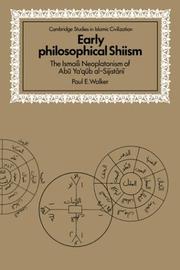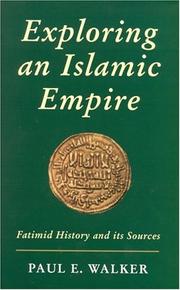| Listing 1 - 3 of 3 |
Sort by
|

ISBN: 0521441293 0521060826 0511520646 0511833970 9780521441292 9780511520648 9780521060820 Year: 1993 Publisher: Cambridge Cambridge University Press
Abstract | Keywords | Export | Availability | Bookmark
 Loading...
Loading...Choose an application
- Reference Manager
- EndNote
- RefWorks (Direct export to RefWorks)
The Ismailis, among whom are the followers of the Aga Khan, rose to prominence during the fourth Islamic/tenth Christian century. They developed a remarkably successful intellectual programme to sustain and support their political activities, promoting demands of Islamic doctrine together with the then newly imported sciences from abroad. The high watermark of this intellectual movement is best illustrated in the writings of the Ismaili theoretician Abu Yaq́ub al-Sijistani. Using both published and manuscript writings of al-Sijistani that have hitherto been largely hidden, forgotten or ignored, Dr Paul Walker reveals the scholar's major contribution to the development of philosophical Shiism. He analyses his role in the Ismaili mission (da'wa) of that time and critically assesses the major themes in his combination of philosophy and religious doctrine.
Ismailites --- -Neoplatonism --- -Alexandrian school --- Church history --- Hellenism --- Philosophy --- Philosophy, Ancient --- Platonists --- Theosophy --- Ismaili --- Ismailians --- Assassins (Ismailites) --- Shīʻah --- Doctrines --- -History --- History --- Abu Ya'qub al-Sijistani, Ishaq ibn Ahmad --- -Contributions in Islamic philosophy --- Abu Yaqub al-Sijistani, Ishaq ibn Ahmad, --- Contributions in Islamic philosophy. --- Neoplatonism --- History. --- Ismailis --- Alexandrian school --- Doctrines&delete& --- Abū Yaʻqūb al-Sijistānī, Isḥāq ibn Aḥmad, --- Abū Yaʻqūb al-Sijzī, Isḥāq ibn Aḥmad, --- Sijistānī, Abū Yaʻqūb Isḥāq ibn Aḥmad, --- أبو يعقوب السجستاني، إسحاق ابن احمد --- أبو يعقوب السجستاني، إسحاق بن أحمد --- أبو يعقوب السجستاني، إسحق بن أحمد --- أبو يعقوب السجستاني، اسحق بن أحمد، --- Arts and Humanities --- Religion --- Ismailites - Doctrines - History. --- Neoplatonism - History. --- Abu Yaqub al-Sijistani, Ishaq ibn Ahmad, - 10th cent. - Contributions in Islamic philosophy. --- Abu Yaqub al-Sijistani, Ishaq ibn Ahmad, - 10th cent.
Book
ISBN: 9004548629 Year: 2023 Publisher: Leiden : Brill,
Abstract | Keywords | Export | Availability | Bookmark
 Loading...
Loading...Choose an application
- Reference Manager
- EndNote
- RefWorks (Direct export to RefWorks)
"The chapters of this volume contain a series of detailed studies of various aspects of Fatimid rule in the regions of its Mediterranean and Near Eastern empire, 909 to 1171 AD, including separately the role of the imam-caliph, wazir, chief qadi and da i, and other political and public offices of this Shi i caliphate. Geographically it covers North Africa, Sicily, the Levant, Hijaz, Cairo and Egypt in the medieval period, with special attention to books, science and libraries, court society, festivals, intellectual traditions and Ismaili doctrines, its religious appeal, military, enemies and rivals, among them the Abbasids, Umayyads, and Ibadis"--
Fatimites. --- Fatimites --- History.

ISBN: 1860646921 1860648754 9781860646928 Year: 2002 Volume: 7 Publisher: London I. B. Tauris
Abstract | Keywords | Export | Availability | Bookmark
 Loading...
Loading...Choose an application
- Reference Manager
- EndNote
- RefWorks (Direct export to RefWorks)
Fatimites. --- Fatimites --- Fatimides --- Historiography. --- Historiographie --- Fātimides --- Caliphs --- Ismailites --- Historiography --- History --- Egypt --- 640-1250
| Listing 1 - 3 of 3 |
Sort by
|

 Search
Search Feedback
Feedback About UniCat
About UniCat  Help
Help News
News